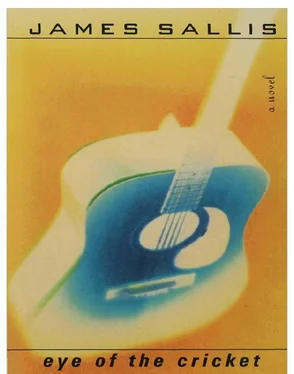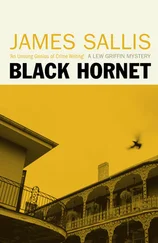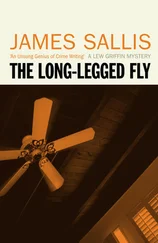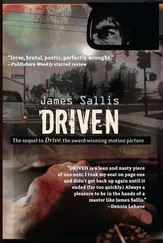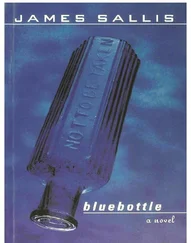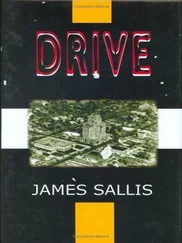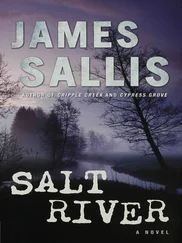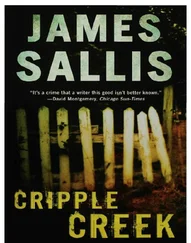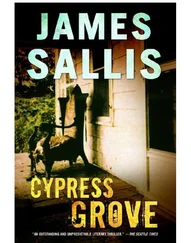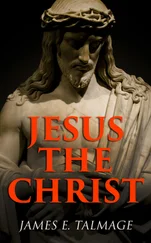James Sallis - Eye of the Cricket
Здесь есть возможность читать онлайн «James Sallis - Eye of the Cricket» весь текст электронной книги совершенно бесплатно (целиком полную версию без сокращений). В некоторых случаях можно слушать аудио, скачать через торрент в формате fb2 и присутствует краткое содержание. Жанр: Криминальный детектив, на английском языке. Описание произведения, (предисловие) а так же отзывы посетителей доступны на портале библиотеки ЛибКат.
- Название:Eye of the Cricket
- Автор:
- Жанр:
- Год:неизвестен
- ISBN:нет данных
- Рейтинг книги:3 / 5. Голосов: 1
-
Избранное:Добавить в избранное
- Отзывы:
-
Ваша оценка:
- 60
- 1
- 2
- 3
- 4
- 5
Eye of the Cricket: краткое содержание, описание и аннотация
Предлагаем к чтению аннотацию, описание, краткое содержание или предисловие (зависит от того, что написал сам автор книги «Eye of the Cricket»). Если вы не нашли необходимую информацию о книге — напишите в комментариях, мы постараемся отыскать её.
Eye of the Cricket — читать онлайн бесплатно полную книгу (весь текст) целиком
Ниже представлен текст книги, разбитый по страницам. Система сохранения места последней прочитанной страницы, позволяет с удобством читать онлайн бесплатно книгу «Eye of the Cricket», без необходимости каждый раз заново искать на чём Вы остановились. Поставьте закладку, и сможете в любой момент перейти на страницу, на которой закончили чтение.
Интервал:
Закладка:
"Where you plan on taking me?"
"Picky date, huh."
"You want quality time, you pay for it."
"I guess Lucky Dogs are out?"
Silence in the wires.
"Manuel's Tamales, then. Cart's usually down on the corner by now."
I may have humphed, or whistled a bar or two of Bobby McFerrin's "Don't Worry, Be Happy."
"Okay, okay. Praline Connection do the trick?"
"Frenchmen, right?" There were two, one in the Faubourg Marigny, close to the river, another uptown, in the warehouse district. Same food, but they might as well be in separate countries.
"You got it. Thirty minutes?"
"Sure." You can be any place in New Orleans in thirty minutes.
Sitting already over his second beer as I came in, Don pushed an envelope across the table to me. Documents inside tracked the black Honda, a rental car up till thirteen months ago and sixty thousand miles, then sold at auction. Mostly rented instate. Computer-generated list of clients, stat of the title showing sale to one George Van Zandt, current registration, police theft report. It had been taken off a lot outside an abandoned bowling alley and across from a tiny Chinese restaurant much favored by the Metairie lunchtime crowd.
"Hope it helps," Don said.
Then Philip, one of the owners, looking the very image of the restaurant's cameolike logo in white shirt, tie, hat and close-cropped beard, was there to take our order. Fried chicken and another beer for Don, lima beans, rice and iced tea for me.
A parade of thirty or more young people went by in the street outside, curiously silent for all their number and collective motion, as though the wraparound windows were soundproof or the whole thing on TV with the volume off. The effect was eerie, unsettling, like peering into another world. Half a block behind the others, two young men held aloft a banner: HOW LONG CAN WE REMAIN SILENT?
"You were saying," I told Don, "how you were about to go postal."
He shook his head, drank before he spoke.
"Sometimes I look around me in the squad room and I think: I'm all alone here, the rest aren't human, any of them. But if they're not human, what are they?
"It wears you down, I know that, what you see day after day, how little you can do about any of it. You just keep slapping on patches, trying to hold yourself together. Trying to protect yourself, too, I guess. Finally you have so many patches there's not much left of the coat."
As so often, we think we're speaking of others and actually speak of ourselves. A point not lost on Don.
"There's one part of me that more than anything wants civility back, Lew. People saying please and thank you, opening doors for one another, letting other cars go first, keeping quietly and politely to themselves. I don't know. Maybe that's some kind of Republican dream, looking back at something that was really never there, trying to re-create it."
Philip brought our food, along with a fistfulof hot sauces in bottles. I sprinkled clear Crystal over my beans and rice.
"Another part just wants it all stopped, the crime, the killing-and that part doesn't really care much how. That part scares me. To hell, it says, with civility. To hell with individual rights, due process, equal protection under the law. Constitution? Democracy? Civil rights? Nice ideas, folks, really fine. You hold on to those, you hear? Butright now let's put them up on the shelf where they belong and get on with real life, let's just get the goddamn job done."
I thought again how, because of poverty, polarity and crime, we've become a nation without real cities-one, instead, of fenced villages shoved up against one another-and how, because we have no cities, because increasingly we're afraid to venture out and engage the world and have in our playpens toys like TVs and on-line computers that we believe connect us but insteadrender us ever more apart, ever more distracted and discrete, we've become a nation without culture.
I suspect, of course, in my liberal heart of hearts, that it's all intimately connected. That losing sense of community and culture irrevocably erodes the soul.
We'd tramped this ground many times before, Don and I. I'd told him how in my late teens it came to me with the force of revelation that America's racial problem has never been so much racial as fundamentally (in this supposedly classless society) a class problem.
So there we were, two old farts singing their sad praise of yesterdays. One of them, who carried a gun, wanting people to be nice to one another again while authorities mowed down wrongdoers, the other, who'd learned better than to cany one, smiling out of a black face suspended forever between the anxieties and ambitions of two worlds.
I'd just read Madison Smartt Bell's novel about the Haitian slave uprising of 1795 (Toussaint-Louverture, remember? another early hero of mine) and paraphrased for Don what Bell had told a Washington Post interviewer. That now we're having our own race war, that it's a slow-motion race war, disguised as crime in the streets. And that nobody, black or white, wants to admit what's happening.
Which made me think, when I read it, of Chester Himes's apocalyptic late stories and novels.
Don nodded. Then his face lifted, following something outside, beyond the glass. My own eyes went around as the door opened. Don rose, chair legs rasping back loudly on the cement floor.
"Hey. Dad." Words evenly spaced, as though set up on blocks.
"Danny! You okay?"
"What? Hey, sure. What else'd I be? This's my friend Billy." Short bursts of sound.
"Bobby," his friend said, tall and thin and sharp-edged as a shaft of Johnson grass. He wore a black silk suit over a T-shirt with tails out. The T-shirt started off white, but that had been some time back.
"I wish you'd let me know when you're going to be away, Danny. I thought we had an agreement. Just pick up the phone. You know?"
"Hey, I meant to, I really did. Been real busy, though."
"Busy."
"Yeah. Got a new job. Good one this time."
Don looked at him, at his friend, then at me.
"Hellish long hours. Most nights I'm so beat it's all I can do to open up a can of chili and fall in bed."
Bobby said something that sounded like Burr goman.
Don said, "At least you have a place to sleep, then."
"What? Oh, sure. Sure I do. No problem. And money in my pocket. You bet. Just like I said it would be."
Bobby said something else to him, even lower, that I didn't catch.
"Look, Dad. I gotta go, okay? I'll call. Promise."
"Yeah. Yeah, sure you will. Take care, son."
We watched them go out and turn the corner back up towards the Quarter.
Don drank from his Abita. I sipped at my tea.
"He's not going to call," I said.
Don put his empty bottle down. "Not a chance in hell."
"You didn't ask where he was staying,"
"He wouldn't have told me."
Don picked up a piece of chicken and put it back down, wiped grease from his fingers.
"It's a lot worse than you know, Lew."
"Things generally are."
"I love him, Lew. I reallylove him. And there's not one damn thing I can do to help him, or stop him. All I can do is stand by and watch it happen."
He looked down at his fried chicken the way a houngan might peer into spilled fresh entrails.
Signs and signals everywhere, if you just knew how to read them.
22
They were actually still there waiting, most of them anyway, when I took the comer fast and walked in, totally unprepared. No notes, no books, just sweaty clothes and a worried smile on my face.
Felt just like my undergrad days at USNO, in fact.
It had suddenly come to me, on the streetcar back uptown, that this was Monday, and that Monday was a class day. I'd already missed all Wednesday's classes and half of today's. I asked the woman beside me, an older black woman sitting with knees far apart, stockings rolled to her ankles, what time it was.
Читать дальшеИнтервал:
Закладка:
Похожие книги на «Eye of the Cricket»
Представляем Вашему вниманию похожие книги на «Eye of the Cricket» списком для выбора. Мы отобрали схожую по названию и смыслу литературу в надежде предоставить читателям больше вариантов отыскать новые, интересные, ещё непрочитанные произведения.
Обсуждение, отзывы о книге «Eye of the Cricket» и просто собственные мнения читателей. Оставьте ваши комментарии, напишите, что Вы думаете о произведении, его смысле или главных героях. Укажите что конкретно понравилось, а что нет, и почему Вы так считаете.
